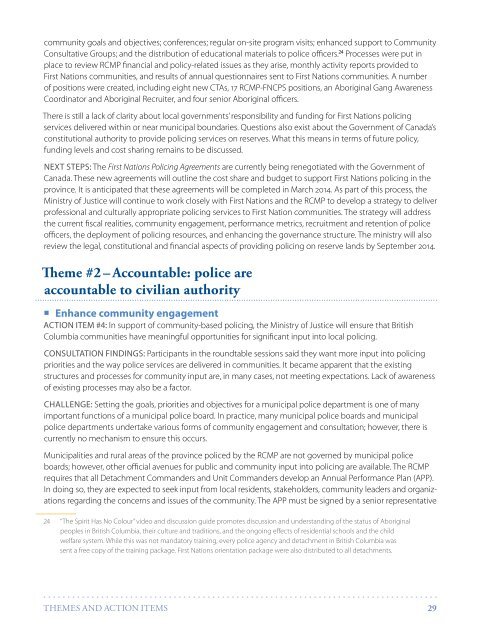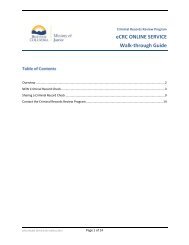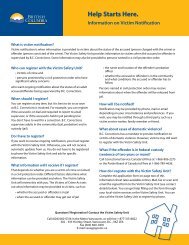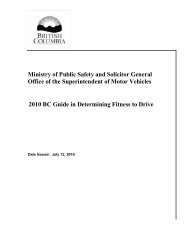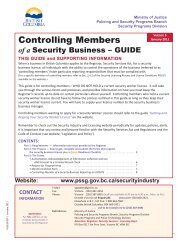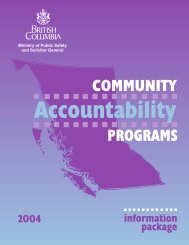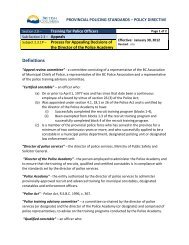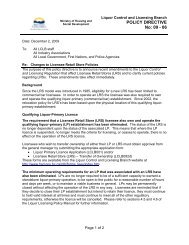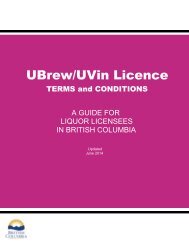BC Policing and Community Safety Plan - Ministry of Justice ...
BC Policing and Community Safety Plan - Ministry of Justice ...
BC Policing and Community Safety Plan - Ministry of Justice ...
Create successful ePaper yourself
Turn your PDF publications into a flip-book with our unique Google optimized e-Paper software.
community goals <strong>and</strong> objectives; conferences; regular on-site program visits; enhanced support to <strong>Community</strong>Consultative Groups; <strong>and</strong> the distribution <strong>of</strong> educational materials to police <strong>of</strong>ficers. 24 Processes were put inplace to review RCMP financial <strong>and</strong> policy-related issues as they arise, monthly activity reports provided toFirst Nations communities, <strong>and</strong> results <strong>of</strong> annual questionnaires sent to First Nations communities. A number<strong>of</strong> positions were created, including eight new CTAs, 17 RCMP-FNCPS positions, an Aboriginal Gang AwarenessCoordinator <strong>and</strong> Aboriginal Recruiter, <strong>and</strong> four senior Aboriginal <strong>of</strong>ficers.There is still a lack <strong>of</strong> clarity about local governments’ responsibility <strong>and</strong> funding for First Nations policingservices delivered within or near municipal boundaries. Questions also exist about the Government <strong>of</strong> Canada’sconstitutional authority to provide policing services on reserves. What this means in terms <strong>of</strong> future policy,funding levels <strong>and</strong> cost sharing remains to be discussed.NEXT STEPS: The First Nations <strong>Policing</strong> Agreements are currently being renegotiated with the Government <strong>of</strong>Canada. These new agreements will outline the cost share <strong>and</strong> budget to support First Nations policing in theprovince. It is anticipated that these agreements will be completed in March 2014. As part <strong>of</strong> this process, the<strong>Ministry</strong> <strong>of</strong> <strong>Justice</strong> will continue to work closely with First Nations <strong>and</strong> the RCMP to develop a strategy to deliverpr<strong>of</strong>essional <strong>and</strong> culturally appropriate policing services to First Nation communities. The strategy will addressthe current fiscal realities, community engagement, performance metrics, recruitment <strong>and</strong> retention <strong>of</strong> police<strong>of</strong>ficers, the deployment <strong>of</strong> policing resources, <strong>and</strong> enhancing the governance structure. The ministry will alsoreview the legal, constitutional <strong>and</strong> financial aspects <strong>of</strong> providing policing on reserve l<strong>and</strong>s by September 2014.Theme #2 – Accountable: police areaccountable to civilian authority•¡Enhance community engagementACTION ITEM #4: In support <strong>of</strong> community-based policing, the <strong>Ministry</strong> <strong>of</strong> <strong>Justice</strong> will ensure that BritishColumbia communities have meaningful opportunities for significant input into local policing.CONSULTATION FINDINGS: Participants in the roundtable sessions said they want more input into policingpriorities <strong>and</strong> the way police services are delivered in communities. It became apparent that the existingstructures <strong>and</strong> processes for community input are, in many cases, not meeting expectations. Lack <strong>of</strong> awareness<strong>of</strong> existing processes may also be a factor.CHALLENGE: Setting the goals, priorities <strong>and</strong> objectives for a municipal police department is one <strong>of</strong> manyimportant functions <strong>of</strong> a municipal police board. In practice, many municipal police boards <strong>and</strong> municipalpolice departments undertake various forms <strong>of</strong> community engagement <strong>and</strong> consultation; however, there iscurrently no mechanism to ensure this occurs.Municipalities <strong>and</strong> rural areas <strong>of</strong> the province policed by the RCMP are not governed by municipal policeboards; however, other <strong>of</strong>ficial avenues for public <strong>and</strong> community input into policing are available. The RCMPrequires that all Detachment Comm<strong>and</strong>ers <strong>and</strong> Unit Comm<strong>and</strong>ers develop an Annual Performance <strong>Plan</strong> (APP).In doing so, they are expected to seek input from local residents, stakeholders, community leaders <strong>and</strong> organizationsregarding the concerns <strong>and</strong> issues <strong>of</strong> the community. The APP must be signed by a senior representative24 “The Spirit Has No Colour” video <strong>and</strong> discussion guide promotes discussion <strong>and</strong> underst<strong>and</strong>ing <strong>of</strong> the status <strong>of</strong> Aboriginalpeoples in British Columbia, their culture <strong>and</strong> traditions, <strong>and</strong> the ongoing effects <strong>of</strong> residential schools <strong>and</strong> the childwelfare system. While this was not m<strong>and</strong>atory training, every police agency <strong>and</strong> detachment in British Columbia wassent a free copy <strong>of</strong> the training package. First Nations orientation package were also distributed to all detachments.THEMES AND ACTION ITEMS 29


